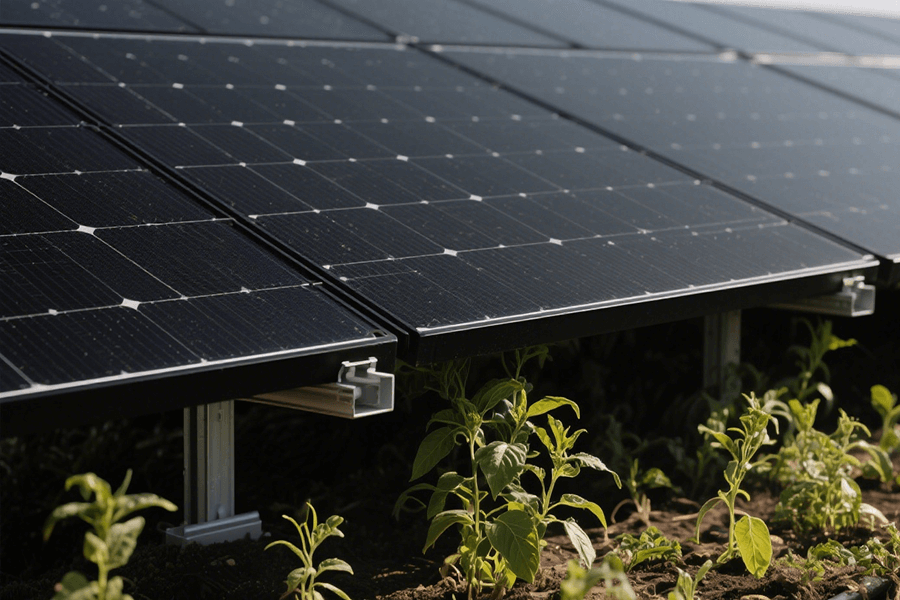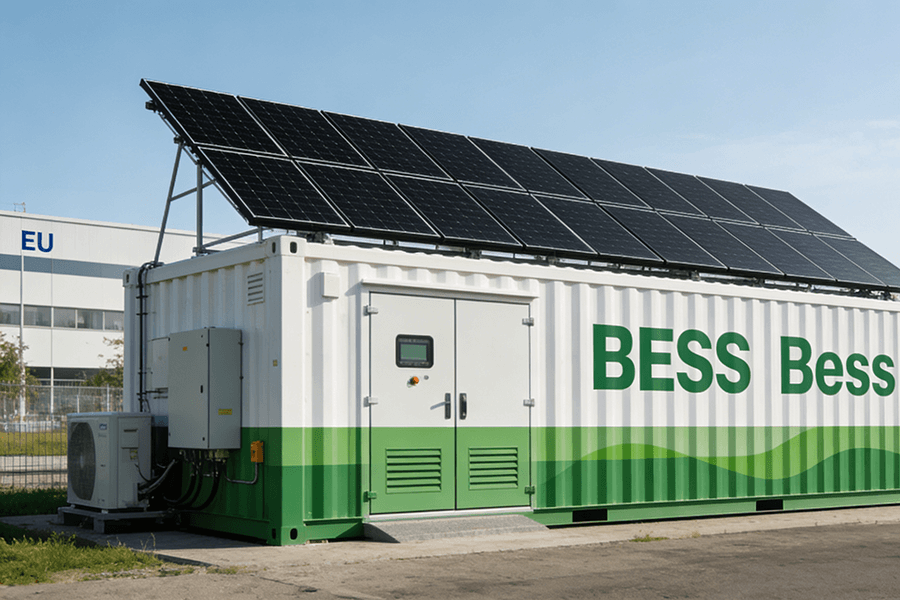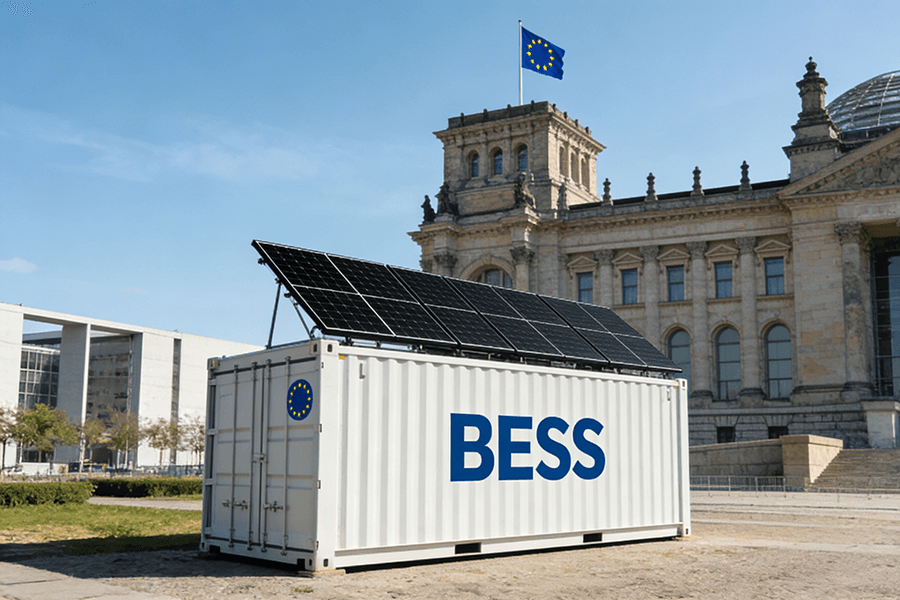
Agrivoltaics in Europe – A Sun-Powered Revolution
Revolutionizing European Agriculture with Agrivoltaics and BESS Containers
Across Europe, agrivoltaics has transcended the realm of niche experimentation, emerging as a rapidly expanding movement that is fundamentally altering the paradigms of agriculture and energy production. The European Union’s aspirational goal of achieving 10 gigawatts (GW) of agrivoltaic capacity by 2030 is not merely a numerical target; it represents a resolute commitment to fostering a symbiotic relationship between agricultural practices and renewable energy generation.
This strategic initiative, as outlined in the EU’s official publication (source), aims to harness the synergy between solar power and farming to create a more sustainable and efficient food-energy system.
The Challenge of Intermittent Solar Power
However, integrating solar energy into agricultural operations presents significant challenges. Solar power, despite its abundant potential, is inherently intermittent:
- Weather Dependence: Energy output fluctuates based on cloud cover and sunlight availability.
- Daily Cycles: Production peaks during the day and drops to zero at night.
For farmers relying on consistent power to operate:
- Irrigation pumps
- Cold storage units
- Greenhouse climate control systems
…this variability poses a substantial risk to crop yields and overall farm productivity. A sudden power disruption can lead to:
- Water shortages
- Spoilage of stored produce
- Suboptimal growing conditions
These issues can have severe economic consequences for agricultural businesses.
The Solution: BESS Containers
This is where the BESS Container (Battery Energy Storage System) becomes crucial. As the linchpin of the agrivoltaic ecosystem, it serves as a sophisticated energy management solution with a two-step process:
- Energy Storage Phase:
-
- During periods of high solar irradiance (e.g., sunny days), when solar panels generate excess electricity, the BESS Container stores the surplus energy in its high-capacity batteries.
- Energy Release Phase:
-
- When solar production decreases due to weather changes or nighttime, the stored energy is discharged, ensuring a continuous and stable power supply to essential farm equipment.
This integration of energy storage technology:
- Mitigates the intermittency issue of solar power
- Enhances the resilience of agrivoltaic systems
- Improves overall operational efficiency
- Establishes a practical solution for modern farming operations
Core Analysis 1: Off-Grid Capabilities – Energy Independence for Remote Farms
Not all farms are fortunate enough to be connected to the grid. For remote agricultural operations—nestled in secluded mountain valleys, expansive coastal plains, or far-flung rural backwaters—relying on diesel generators is a costly and unpleasant necessity. The persistent noise, noxious fumes, and constant need for refueling create a set of challenges that no farmer wants to face. These generators not only drain financial resources but also contribute to environmental degradation, making them an unsustainable long-term solution for powering essential farm operations.
48-Hour Backup: A Safety Net for the Unexpected
The BESS Container revolutionizes the way farms manage their energy needs with its remarkable 48-hour backup capacity. This feature acts as an insurance policy against unpredictable weather conditions and grid failures. Even when the sun is obscured for two consecutive days due to heavy rainstorms or other inclement weather, the BESS Container ensures that critical farm systems, such as irrigation and crop refrigeration, continue to operate without interruption.
This extended backup functionality is especially crucial for maintaining the integrity of perishable crops. For example, in regions where sudden weather changes are common, having a reliable energy source for crop refrigeration can prevent significant losses. Instead of relying on noisy and polluting diesel generators, the BESS Container provides a clean, silent, and continuous supply of power, much like an inexhaustible reserve tank of energy.
Compatibility: Works with Solar Arrays of All Sizes
One of the key strengths of the BESS Container is its versatility and compatibility with solar arrays of varying sizes. Whether you operate a small family farm with a modest 50 kWh solar setup or a large-scale agribusiness with multiple 500 kWh arrays, the BESS Container integrates seamlessly into existing systems.
This scalability allows farms to optimize their energy usage and storage based on their specific production levels. Smaller farms can use the BESS Container to store excess solar energy generated during the day for use at night, reducing their reliance on the grid and lowering electricity costs. Larger agribusinesses, on the other hand, can use multiple BESS Containers to manage the energy output of their extensive solar arrays, ensuring that no energy is wasted and that all operations are powered efficiently.
Diesel Reduction: The Numbers Speak for Themselves
The BESS Container offers a practical and environmentally friendly alternative to traditional diesel generators. Extensive trials, including data from Maxbo Solar’s field tests (available here), have demonstrated the significant impact of pairing a BESS Container with solar arrays on reducing diesel reliance.
The results speak for themselves: farms that adopt this technology experience a 70% reduction in their dependence on diesel fuel. This translates to substantial savings in fuel costs, a significant decrease in harmful emissions, and a quieter working environment.
| Scenario | Diesel Usage (Monthly) | Cost (€/Month) | Emissions (CO₂/Month) |
|---|---|---|---|
| Without BESS Container | 500 liters | €750 | 1.3 tons |
| With BESS Container | 150 liters | €225 | 0.39 tons |
| Reduction | 350 liters | €525 | 0.91 tons |
These numbers not only highlight the economic benefits of switching to the BESS Container but also underscore the positive environmental impact. By reducing diesel usage, farms can play a crucial role in mitigating climate change and contributing to a more sustainable future for agriculture.
Core Analysis 2: Seasonal Energy Management – Solar for Every Season
Europe’s weather is a tale of two extremes: In the Mediterranean region, temperatures can soar above 40°C during the peak of summer, providing an abundance of sunlight that often overwhelms existing energy consumption needs. For instance, in southern Spain, solar panels might generate up to 30% more energy than local farms require during the summer months. In stark contrast, countries in Northern Europe, like Finland, experience winters with prolonged periods of darkness, where solar panels can see their output drop to as little as 10% of summer levels due to reduced daylight hours and frequent cloud cover. The BESS Container turns this imbalance into an advantage.
Summer Surplus: Storing Sunlight for a Rainy (or Cold) Day
During the summer solstice, solar arrays across European farms become powerhouses. In countries like Greece and Italy, where sunlight is most intense, these arrays can produce up to 15 kWh per square meter of solar panel per day. However, this surge in production often exceeds immediate demand. Instead of letting that excess energy dissipate into the grid—at times incurring transmission losses—or going completely unused, the BESS Container acts like a solar savings account. With advanced lithium-ion battery technology, it can store up to 1 MWh of energy per standard 20-foot container, ensuring that every extra kWh is safeguarded for future use.
Winter Warmth: Powering Greenhouses When the Sun is Shy
As winter descends, the solar production landscape transforms dramatically. In regions like Germany and Poland, solar output can drop by up to 60% compared to summer levels. This is where the stored summer energy in the BESS Container becomes invaluable. Greenhouses, which are crucial for year-round crop production, require consistent heat to maintain optimal growing conditions for crops like tomatoes, peppers, and cucumbers. For example, a medium-sized greenhouse covering 1,000 square meters might need around 50 kWh of energy per day to power its heating system. By tapping into the BESS Container’s reserves, farmers can ensure a steady supply of electricity without relying on polluting fossil fuels, reducing their carbon footprint by up to 80% compared to traditional heating methods.
CAP Compliance: Get Paid to Go Green
The EU’s Common Agricultural Policy (CAP) is a cornerstone of sustainable farming initiatives across the continent. Under the new CAP regulations, farmers who adopt eco-friendly practices are eligible for substantial green subsidies. The BESS Container ticks all the boxes required for these incentives:
- Carbon Footprint Reduction: By storing and utilizing solar energy, it significantly cuts down on the use of fossil fuels, helping farms meet stringent EU emissions targets.
- Energy Efficiency: The system optimizes energy use, ensuring that surplus energy is not wasted but rather stored for future needs.
- Alignment with Climate Goals: It supports the EU’s overarching objective of achieving climate neutrality by 2050.
Farmers using BESS can qualify for subsidies covering up to 30% of installation costs, as outlined in the CAP guidelines (https://ec.europa.eu/info/food-farming-fisheries/key-policies/common-agricultural-policy_en). Additionally, there are potential long-term savings on energy bills, making the switch to BESS not only environmentally responsible but also financially viable.
Conclusion: Technical Specs, ROI, and Why Maxbo Solar Leads the Way
Built to Survive Farm Life
The BESS Container is engineered to thrive in the rugged environment of European agriculture, with resilience baked into every design choice:
- Dust-resistant enclosures: Constructed from high-grade IP65-rated materials, these enclosures form an airtight barrier against fine dust particles, ensuring uninterrupted operation in the dry, windy conditions typical of Mediterranean plains and Central European steppes.
- Extreme temperature tolerance: Engineered to maintain peak performance across a wide thermal spectrum, from -15°C in the frigid winters of Scandinavia to 40°C during the scorching Spanish summers. Built-in intelligent cooling and heating systems automatically adjust to ambient temperatures, safeguarding battery health and longevity.
- Modular design philosophy: The container’s flexible architecture allows for seamless scalability. As your farm expands or energy demands increase, simply add additional battery modules—no need for costly system overhauls. This adaptability ensures the BESS Container grows in tandem with your agricultural operations.
ROI: A Smart Investment That Pays for Itself
Let’s break down the financial benefits that make the BESS Container a game-changer for European farmers:
| Cost Savings & Incentives | Details |
|---|---|
| Diesel Expense Reduction | Slashes diesel consumption by 70% for irrigation pumps and crop storage facilities, translating to significant fuel cost savings. |
| Grid Electricity Bill Cuts | Reduces reliance on the grid, especially during peak tariff hours, leading to lower monthly electricity bills. |
| CAP Subsidies Eligibility | Qualifies for European Union’s Common Agricultural Policy (CAP) subsidies, which can offset a substantial portion of the initial investment. |
Investment Breakdown:
- Initial Cost: Ranges from €25,000 to €50,000, depending on the container’s size and battery capacity.
- Payback Period: A swift 3.5 years, after which the system generates pure profit.
- Annual Savings: Yields €10,000–€20,000 in energy cost savings, providing a reliable revenue stream for years to come.
Why Choose Maxbo Solar?
With a decade of dedicated experience in developing agrivoltaic solutions for EU farms, Maxbo Solar stands as a trusted partner for sustainable energy:
- EU-certified Excellence: Our BESS Containers meet the stringent safety and efficiency standards set by the European Union, ensuring peace of mind and regulatory compliance.
- Tailored to Your Needs: Whether you operate a sun-drenched vineyard in Tuscany or a sprawling potato farm in Ireland, our team works closely with you to customize a system that aligns with your specific energy requirements and agricultural practices.
- Unwavering Support: Benefit from 24/7 technical support provided by our team of seasoned agrivoltaic experts. From installation to ongoing maintenance, we’re committed to keeping your energy system running smoothly.
At Maxbo Solar (www.maxbo-solar.com), we’re not just selling BESS Containers—we’re empowering European farmers to achieve energy independence and drive the future of sustainable agriculture. Let’s cultivate a brighter, greener future for your farm, together.






